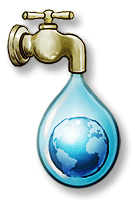What is REPIDISCA?
Spanish version: Qué es REPIDISCA?
The aim of the Pan American Information Network on Environmental Health (REPIDISCA) is to disseminate available information on:
- Environmental health
- Environmental epidemiology
- Environmental toxicology
- Sanitary & environmental engineering
- Water supply
- Waste water
- Solid wastes
- Hazardous wastes
- Occupational health
— REPIDISCA selects, analyzes and disseminates bibliographic material, placing emphasis on documents produced in Latin America and the Caribbean. Special attention is given to collect gray literature such as research and technical reports, theses, conference papers, standards, videos, software and training material.
— REPIDISCA users are provided with information on the latest technologies and environmental management approaches produced worldwide.
— REPIDISCA is a decentralized system operating in Latin America and the Caribbean. National institutions, acting as Cooperating Centers, together with the National Coordinating Centers are responsible for the development of REPIDISCA in their own countries. CEPIS is the network Regional Coordinator and consolidates the information sent by the Cooperating Centers in several data bases.
— REPIDISCA promotes the exchange of information and facilitates contacts among professionals and institutions working in the environmental health field.
— REPIDISCA Cooperating Centers (CCs) 342 in 24 Latin American and Caribbean countries daily identify information on environmental health available in libraries, documentation centers and other information units located in the Latin American and Caribbean Region.
— REPIDISCA participation in the Network of Networks facilitates access to the documentation of 19 information networks from Latin America and the Caribbean. Besides, its data base is compatible with LILACS (Literatura Latinoamericana en Ciencias de la Salud). It communicates with other world information systems on the same field, such as Energy and Environment of UNIDO.
— REPIDISCA considers important to emphasize the financial support of the German Technical Cooperation Agency (GTZ).
Repidisca Cooperating Centers
- To encourage the exchange of information and to strengthen institutional links among the Network Cooperating Centers.
- To identify within the institution, the information produced in environmental health: reports, projects, researches, theses, manuals, technical standards, conference papers, journal articles, books. Also, software, slides, visual aids, and films.
- To record the documents in worksheets or diskettes, according to REPIDISCA methodology.
- To record the serial collection in the REPIDISCA serial form. These records are included in the Serial Union Catalogue.
- To provide photocopies of the documents, accepting the REPIDISCA coupons as a means of payment.
- To promote the services and products of the Network in congresses, courses and meetings of professional associations. To disseminate brochures, posters, etc.
- To establish personal communication with other Cooperating Centers. Participation in the REPIDISCA coordination meetings are strongly encouraged.
- Access to updated and complete information.
- Training in documentary and computerized techniques, through workshops, in-service training or self-training manuals.
- Acceso a la información documental mas completa y actualizada.
- Advisory on information center organization, design and development of national networks, financing proposals, etc.
- Copy of the REPIDISCA data base in CD-ROM and access to databases by e.mail.
- Interlink with international information systems.
- Worldwide dissemination of the documents produced by the Cooperating Centers.
- Partial support for the acquisition of:
- Publications of the Pan American Health Organization (PAHO)
- Basic collections on sanitary engineering and environmental sciences.
Through PAHO, acquisition of necessary equipment (microcomputers, CD-ROM readers, modem), at special prices or partial donations.
Payment of services in national currency or REPIDISCA coupons.
Free of charge publications: Network methodological manuals and the REPIDISCA Computerized Package using UNESCO CDS/ISIS to automatize information units.
Bibliographic searches in international data bases available in CD-ROMs installed at CEPIS or by electronic mail.

